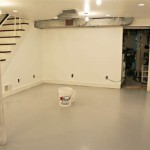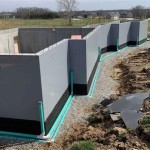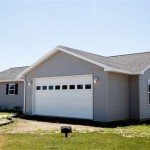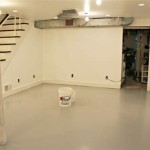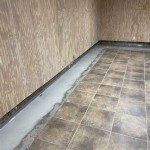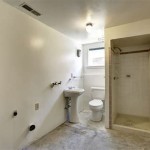Best Flooring Options For Concrete Basement Floors
Concrete basement floors present unique challenges and opportunities when it comes to selecting the appropriate flooring. Unlike above-ground rooms, basements are often susceptible to moisture, temperature fluctuations, and potential flooding. Therefore, choosing a flooring material that can withstand these conditions is paramount. Considerations must also include the level of comfort desired, the aesthetic appeal sought, and the overall budget available for the project.
This article will examine several popular and effective flooring options for concrete basements, outlining their advantages, disadvantages, and suitability for different basement environments. We will explore materials renowned for their moisture resistance, ease of installation, and durability, enabling informed decisions regarding the best flooring solution for a given basement.
Evaluating Basement Conditions
Before selecting a flooring material, it is critical to thoroughly assess the basement's existing conditions. This involves checking for moisture issues, such as water seepage through the walls or floor, condensation, or signs of mold growth. High moisture levels can damage many flooring materials, leading to costly repairs or replacements. If moisture is present, it must be addressed before any flooring installation proceeds. This may involve improving drainage around the foundation, applying a waterproof sealant to the concrete slab, or installing a dehumidifier.
The levelness of the concrete floor is another essential factor. Uneven surfaces can cause problems with flooring installation, resulting in an uneven, uncomfortable, or even structurally unsound floor. Significant irregularities may require self-leveling concrete or other corrective measures to create a smooth, even surface before installing the chosen flooring. Testing kits can also assist in determining the pH level of the concrete. A high pH can interfere with the adhesion of certain flooring adhesives and coatings, thus requiring a neutralizer.
Understanding the intended use of the basement is also crucial. A basement used as a living space, such as a family room or bedroom, will require a more comfortable and aesthetically pleasing flooring option than a basement primarily used for storage or a workshop. Foot traffic, potential for spills, and impact resistance are all factors to consider when selecting a flooring material that will meet the specific needs of the space.
Popular Flooring Options for Concrete Basements
Several flooring materials are well-suited for concrete basements, each offering a unique combination of benefits and drawbacks. These options include engineered wood, laminate, luxury vinyl, tile, epoxy coatings, and carpet tiles. Each of these offers different aspects, from cost-effectiveness to moisture management and aesthetics.
Engineered Wood Flooring: Engineered wood consists of a thin layer of hardwood bonded to a plywood or fiberboard core. This construction makes it more resistant to moisture fluctuations than solid hardwood, making it a better choice for basements. However, it is still susceptible to water damage and should not be used in basements with high moisture levels. Installing a moisture barrier underneath the flooring is essential to protect it from any rising dampness. The advantages are that it provides a natural wood look and feel. The disadvantages include potential for moisture damage, higher cost compared to some other options, and possibility of requiring professional installation. It is best suited for basements with controlled humidity.
Laminate Flooring: Laminate flooring is a synthetic material that mimics the appearance of wood, stone, or tile. It is relatively inexpensive, easy to install, and resistant to scratches and stains. While more moisture-resistant than solid hardwood, laminate flooring can still be damaged by prolonged exposure to water. A moisture barrier is crucial for installation. Its advantages include affordability, ease of installation, and scratch resistance. Disadvantages are that it may not feel as luxurious as other options and can be slippery when wet. It is often suitable for general-purpose basements where affordability is a key concern.
Luxury Vinyl Flooring (LVT/LVP): Luxury vinyl flooring is a highly durable and water-resistant option that is well-suited for basements. It comes in a variety of styles, including planks (LVP) and tiles (LVT), and can mimic the look of wood, stone, or tile. Luxury vinyl is easy to install, clean, and maintain, and it is resistant to scratches, stains, and fading. Advantages include excellent water resistance, durability, and variety of styles. Disadvantages may include higher cost compared to some other vinyl options, and potential for indentations from heavy furniture. It is suitable for basements prone to moisture or potential flooding.
Tile Flooring: Tile is an excellent choice for basements due to its waterproof and durable nature. Options include ceramic tile, porcelain tile, and natural stone tile. Tile is resistant to moisture, stains, and scratches, making it a long-lasting and low-maintenance option. However, tile can be cold and hard underfoot, so adding rugs or radiant heating can improve comfort. Advantages include water resistance, durability, and variety of styles. Disadvantages include coldness underfoot, higher installation costs, and potential for cracking if the subfloor is uneven. Tile is suitable for high-moisture basements, such as laundry rooms or bathrooms.
Epoxy Coatings: Epoxy coatings are a durable and seamless flooring option that is ideal for basements. Epoxy is resistant to chemicals, stains, and impact, making it a good choice for workshops or garages. It can also be decorative, with options for adding color, patterns, or metallic effects. Epoxy is relatively easy to clean and maintain. Advantages include seamless surface, durability, and resistance to chemicals and stains. Disadvantages include a challenging installation process, potential for strong odors during application, and limited design options compared to other materials. It is suitable for workshops, garages, or other utility spaces in the basement.
Carpet Tiles: Carpet tiles are a modular flooring option that can be a good choice for basements, especially those used as living spaces. They are easy to install and replace if damaged, and they provide warmth and sound insulation. Look for carpet tiles with a waterproof backing to protect against moisture. Regular cleaning is essential to prevent mold and mildew growth. Advantages include warmth, sound insulation, and ease of installation and replacement. Disadvantages include susceptibility to moisture damage, potential for mold and mildew growth, and requirement for regular cleaning. It is suitable for living areas in basements with controlled humidity.
Key Considerations for Installation
Proper installation is crucial for ensuring the longevity and performance of any flooring material in a basement. Preparing the concrete subfloor is the first and most important step. This involves cleaning the floor thoroughly to remove dirt, dust, grease, and any existing adhesives. Any cracks or imperfections should be repaired using a concrete patch or filler compound. Ensuring the floor is level and smooth is essential for a successful installation.
The use of a moisture barrier is highly recommended for most flooring options in basements. This barrier helps to prevent moisture from seeping up through the concrete and damaging the flooring material. Moisture barriers can be in the form of a plastic sheeting or a liquid-applied membrane. The type of barrier used will depend on the specific flooring material and the level of moisture present in the basement.
For floating floors, such as laminate or luxury vinyl plank, an underlayment is required. This provides cushioning, sound insulation, and helps to even out minor imperfections in the subfloor. The underlayment should be water-resistant to further protect the flooring from moisture. For flooring options that require adhesive, such as tile or carpet tiles, it is essential to use a high-quality adhesive that is specifically designed for use on concrete. The adhesive should also be moisture-resistant to prevent the flooring from lifting or peeling.
When installing tile, proper grouting is essential to prevent water from seeping underneath the tiles. The grout should be sealed to protect it from stains and moisture. For epoxy coatings, it is important to follow the manufacturer's instructions carefully to ensure proper adhesion and curing. This may involve multiple coats and specific curing times.
Professional installation is recommended for some flooring options, particularly those that require specialized tools or techniques. A professional installer can ensure that the flooring is installed correctly and will provide a warranty for their work. However, with careful planning and attention to detail, many flooring options can be successfully installed by homeowners with basic DIY skills.

What Is The Best Flooring For A Concrete Floor Basement Illinado Llc

How To Choose The Right Floor For Your Basement Gc Flooring Pros

Thermaldry Basement Flooring Systems Waterproof

A Guide To Stained Concrete Basement Floors

Stained Concrete Basement Floor Ideas

2024 Buyer S Guide Best Basement Flooring Over Concrete

What Is The Best Flooring For A Concrete Floor Basement Illinado Llc

Basement Flooring Options Choosing The Best Solutions

Best Basement Flooring Options Costs And Ideas 2024 Hgtv

The Best Flooring Options For Your Basement

